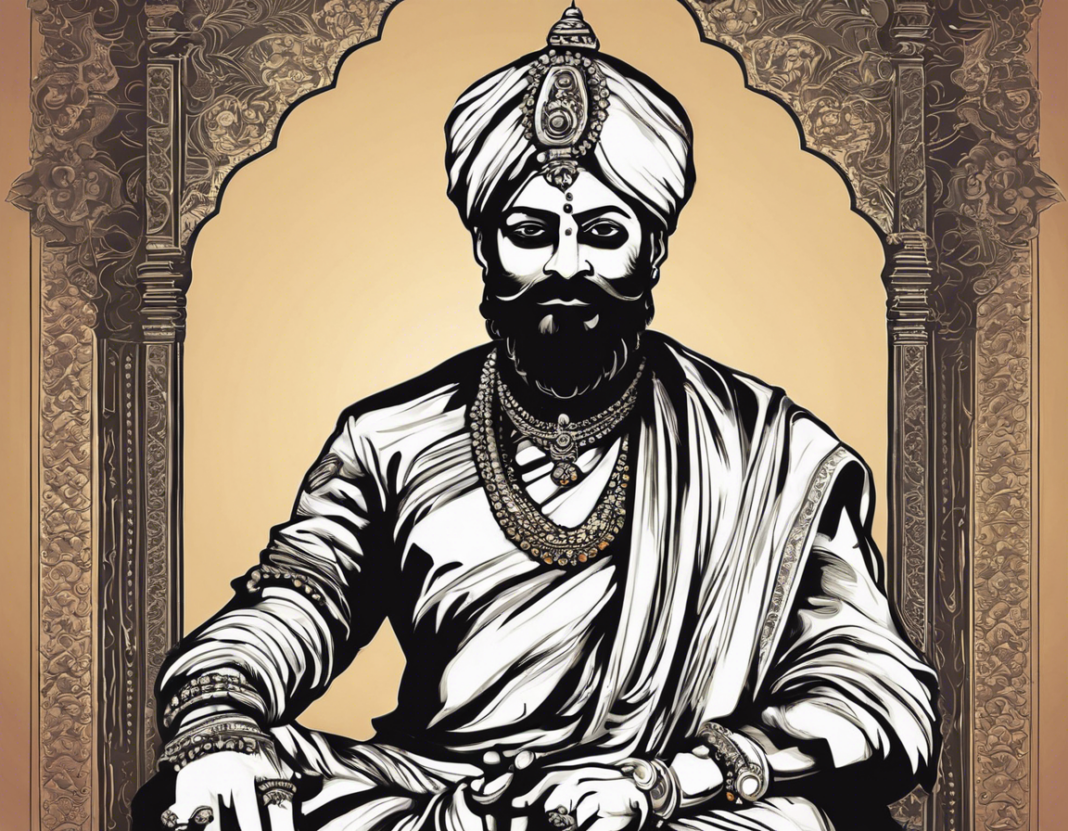Introduction
In the annals of Indian history, the name Shivaji Maharaj shines like a beacon of valor, leadership, and independence. Born on February 19, 1630, in the illustrious lineage of the Bhosale clan, Shivaji became the founder of the Maratha Empire in the 17th century. This legendary ruler remains a revered figure in India, especially in Maharashtra, where he is hailed as the epitome of Marathi pride and warrior ethos. His contributions to Indian history, especially in the realms of military strategy, administration, and statecraft, are widely celebrated and studied. Let’s delve deeper into the life and legacy of this iconic figure.
Early Life and Rise of Shivaji Maharaj
Shivaji Maharaj was born to Shahaji Bhosale and Jijabai in the hill-fort of Shivneri, near the city of Junnar in Pune district. From an early age, Shivaji was exposed to the turbulent political landscape of medieval India, characterized by the Mughal Empire in the north and the Adilshahi Sultanate in the south. His mother, Jijabai, played a pivotal role in shaping his values and ideologies, instilling in him a deep sense of duty, honor, and reverence for Hindu traditions.
The Breathtaking Exploits of Shivaji Maharaj
Shivaji Maharaj embarked on a remarkable journey marked by audacious military campaigns, deft diplomatic maneuvers, and astute statecraft. His guerilla warfare tactics, innovative fortifications, and swift cavalry raids became the stuff of legend, earning him the moniker of the “Mountain Rat.” Shivaji‘s conquests of key forts like Raigad, Pratapgad, and Panhala symbolize his military acumen and strategic brilliance.
Establishment of Swarajya and Administration
The crowning achievement of Shivaji Maharaj‘s legacy was the establishment of Swarajya, a self-governing Maratha kingdom that challenged the hegemony of the Mughals and other regional powers. His administrative reforms, including the concept of Ashta Pradhan (Council of Eight Ministers), revenue system based on equitable distribution, and promotion of decentralized governance, laid the foundation for a nascent Maratha Empire.
Legacy and Impact
The legacy of Shivaji Maharaj transcends the boundaries of time and geography, resonating with the aspirations of millions of Indians for freedom, justice, and self-determination. His fearless spirit, commitment to social justice, and respect for all communities continue to inspire generations. The celebration of Shivaji Jayanti and the construction of iconic monuments like Shivaji’s statue in Mumbai reflect the enduring appeal of this warrior king.
Key Principles of Shivaji Maharaj
- Dharma and righteousness: Shivaji believed in upholding the principles of dharma and righteousness in both personal conduct and governance.
- Strategic Vision: His ability to envision long-term goals and plan strategic moves set him apart as a military genius.
- Warrior Spirit: The courage, valor, and warrior ethos of Shivaji remain exemplary for aspiring leaders and patriots.
- Inclusivity: Shivaji‘s administration was marked by inclusivity, religious tolerance, and respect for diverse cultural traditions.
Unraveling the Myths and Realities
Over the centuries, the legacy of Shivaji Maharaj has been shrouded in myths and legends, often obscuring the historical reality. It is essential to separate fact from fiction and critically evaluate the contributions of this iconic figure to Indian history. By engaging with primary sources, scholarly research, and critical analysis, a more nuanced understanding of Shivaji and his era can be attained.
FAQs about Shivaji Maharaj
-
Was Shivaji Maharaj a freedom fighter?
Answer: Yes, Shivaji Maharaj is often hailed as a precursor to the Indian freedom struggle for his resistance against Mughal and Adilshahi forces. -
What was the significance of Shivaji’s coronation at Raigad?
Answer: The coronation of Shivaji Maharaj at Raigad in 1674 symbolized the establishment of Swarajya and the formal declaration of Maratha independence. -
Did Shivaji Maharaj have a naval force?
Answer: Yes, Shivaji Maharaj established a potent naval force to challenge European powers and safeguard coastal territories. -
How did Shivaji Maharaj inspire his troops?
Answer: Shivaji Maharaj inspired his troops through his personal courage, strategic leadership, and equitable treatment of soldiers from all backgrounds. -
Did Shivaji Maharaj have any notable adversaries?
Answer: Shivaji Maharaj faced formidable adversaries like Aurangzeb, Afzal Khan, and Siddi Jauhar during his military expeditions.
Conclusion
In conclusion, the legend of Shivaji Maharaj endures as a testament to the indomitable spirit of India and the timeless values of courage, integrity, and sovereignty. His life and legacy continue to inspire millions to strive for justice, equality, and righteous governance. By unraveling the myths and realities surrounding Shivaji, we can gain a deeper appreciation for his multifaceted persona and his enduring impact on Indian history and culture.

